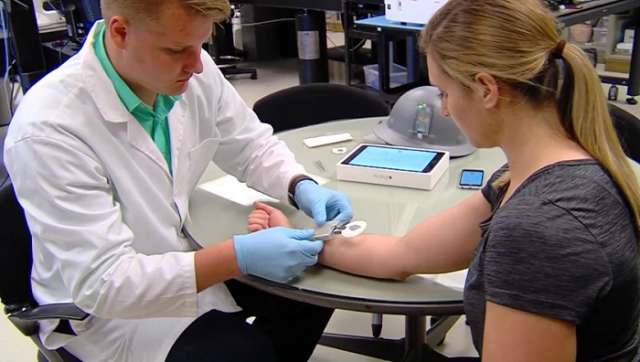Your sweat could tell you when to make a baby

“This is the hard-science end of wearables,” said Robert Beech, chairman and co-founder of Eccrine Systems.
Fitness wearables such as Fitbit and Jawbone measure heart rate, steps, sleep and a few other metrics. The wearable market and the technology opportunities are vast. Oral Roberts University has distributed around 1,800 Fitbits to freshman and transfer students so they can more easily track their steps and heart rate as part of their core curriculum requirement for physical health.
Beech and Eccrine want to turn wearables into mini-laboratories like the kind that slice and dice your blood samples and tell you a million things such as whether you are at risk of prostrate cancer or what your Vitamin D level is.
“The whole goal is non-invasive measure of bio-molecules that can inform us about physical functions and dysfunctions and medical conditions,” Beech said. “The goal is not to have to stick needles and catheters into people. In the context of daily life, work, sleep, play, the goal is to be to have a window into the current physiological status of the wearer.”
Eccrine’s technology will grab sweat as soon as it is secreted and gush a pile of data about your biochemical status to a collector — your smarthphone or a cloud-based analytical system — that can search biomarkers that can alert the wearer to potential maladies.
“What blood results are for invasive medicine using needles, sweat has to be for noninvasive to get and measure cholesterol, cortisol, ovulation monitoring, fertility, reproductive health,” Beech said. “It could be used to determine electrolyte loss, which can be used for cardiac patients.”
Beech said Eccrine is 18 months from producing its first wearable, either the wristband, headband or skin patch. One application the firm is working on is a headband that can go under a worker’s hard hat to measure chemical and environmental toxins. Think of the radiation badge that workers now wear to measure whether they are in a “hot” zone.
The science of sweat is still in the early stages. Beech said, and the opportunities are just emerging. But the stakes are high.
“If you are going to tell people that they are okay, you better be right about that,” he said. “And if you are going to tell them to stop and go do something, you better be right about that, too.”
Eccrine launched three years ago as an effort by the Air Force and the University of Cincinnati to use sweat detection to measure the health status of soldiers. The military is interested in monitoring the hydration level of its soldiers in the field.
Eccrine has signed a $3.96 million contract to work on the real-time measurement of the status of ground troops and pilots through sweat, Bloomberg reported.
Back at Oral Roberts University, chief information officer Mike Mathews, who spent 12 years at Cray Research, said the use of Fitbits to monitor heart and steps has taken the place of manual reporting by students.
“You can actually take our new wireless technology and allow the Fitbit to connect to it and that data can automatically be put through a secure system,” he said. “Nobody has to manually enter it any more.”
He said faculty members in the health fitness curriculum estimate that the fitness wearables have saved 700 man-hours. Faculty have access to the number of steps and heart rate so they can more accurately grade students on fitness goals. Any data beyond that is kept secure from prying eyes.
Bloomberg said BP, Target and Time Warner have also given employees Fitbits to help employees monitor their fitness. An added benefit is lowering insurance costs.
/Washington Post/















































